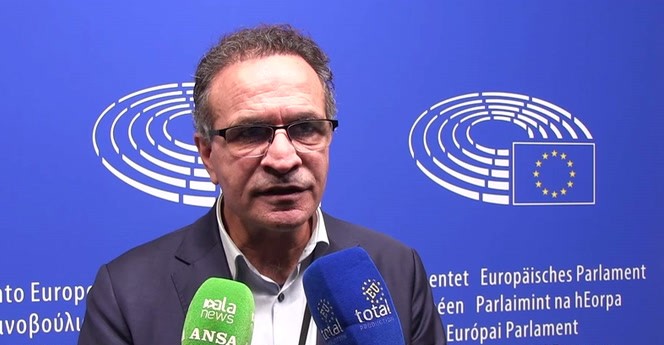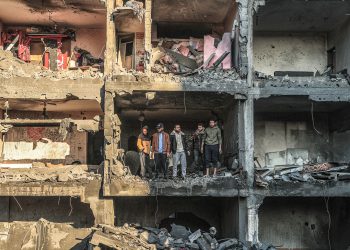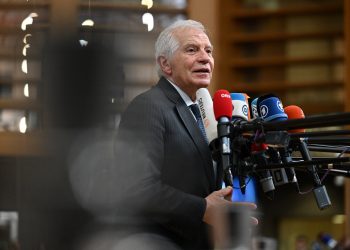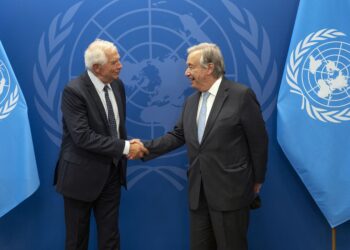Brussels – What is lacking is not authority or tools but “political will.” As the Gaza Strip descends one step closer to hell every day, with 20,000 casualties in just over two months due to Israel’s carpet bombing and more than a quarter of the population at risk of famine, the European Union does not waver from the support to Tel Aviv’s military action. A position that in the rest of the world is increasingly ambiguous.
“Who today believes Europe anymore when it claims to uphold international law?” wonders Adel Atieh, ambassador of the Palestinian National Authority to the EU. In an interview with Eunews, the Palestinian diplomat explained the frustration of a people who “no longer have a political horizon” and are experiencing one of the most dramatic pages of their history.
Eunews: Ambassador Atieh, what do you think of the position expressed by the EU countries on the conflict between Israel and Hamas at the last European Council?
Adel Atieh: “I was surprised that there were no conclusions on the Middle East. The situation on the ground has evolved dramatically. In the face of the massive shelling of civilians in Gaza, I expected the EU to at least adopt conclusions calling for a ceasefire. The situation is dramatic, and the humanitarian crisis needs a clear stance from the EU. If there is no call for a ceasefire, it means that you agree with what Israel is doing on the ground.”
Eunews: But do you see any evolution in the EU’s statements on the conflict from October 7 to today?
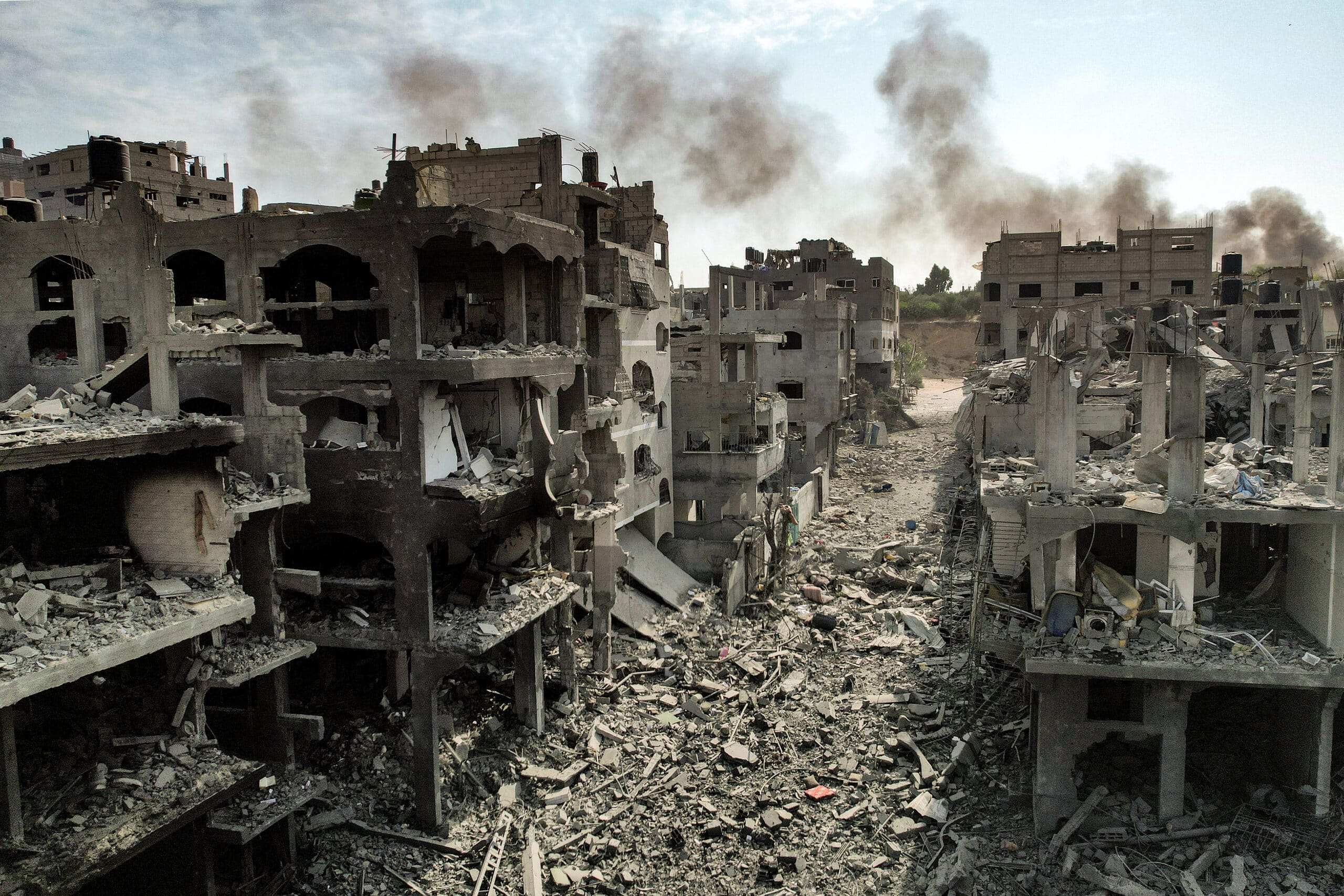
Atieh: “If we measure the EU’s current position against the initial one, actually we do see an evolution: at first unconditional support for Israel and its right to defend itself, then approval but respecting international humanitarian law. But that is not enough, given the scale of the massacre. Today, we are close to 20,000 dead, 1 percent of Gaza’s population, and more than 7,000 missing under the rubble. The EU’s position does not live up to its political and moral responsibility.
It is unacceptable for the EU in the 21st century to turn a blind eye to the ongoing genocide in Gaza. Until now the EU has chosen to follow the American position. There is a need for the EU to distance itself from the United States and try to speak with a reasonable voice. The EU has the authority and the means to pressure Israel, but it lacks the political will.”
Eunews: You talk about a lack of political will. Hasn’t the European Union become insignificant in the Middle East?
Atieh: “Israel has learned to disregard the positions of the international community and the EU because it knows they are statements without actions. That is why Israel doesn’t give a damn, because it knows very well that the EU will adopt statements but not concrete measures to impose anything. On the contrary, the EU is complicit in what Israel does, because not only does it not call for a cease-fire, but it provides political and diplomatic protection to Israel in international institutions.”
We believe that the EU has the possibilities and tools to impact the behavior of the state of Israel. The EU is the first trading partner for Israel: if it threatened to suspend the Association Agreement, Israel would react immediately. If the EU encouraged the work of the International Criminal Court on war crimes committed by Israel, Israel would stop and think.”
Eunews: So you agree with the accusation made against the EU of using double standards in Ukraine and Gaza?
Atieh: “There is a policy of political and moral double standards. The EU has powerful tools to sanction Israel, economically, politically, and diplomatically. Not only does it do nothing to stop the war, it also encourages Israel to continue the slaughter. The EU has rallied in defense of international law to support Ukraine. On the other side, it stands behind an occupying power that violates all the rules of international law. The EU is losing its credibility and legitimacy as a global political actor that claims to uphold the law. It is a victim of the disequilibrium of its positions. Today, who believes Europe anymore when it claims to defend international law?”
Eunews: However, Gaza is ruled by an extremist group that the EU recognizes as a terrorist organization.
Atieh: “It is completely ridiculous to say that you can’t call for a cease-fire because you have to eliminate Hamas. This is Israel’s fifth war on Hamas, and it has never succeeded. And even if it succeeds in eliminating its military infrastructure, it does not mean that Hamas will disappear. Hamas is an idea, an ideology that finds its credibility in the failure of the peace process. Hamas’ only source of legitimacy today is the failure of the two-state solution: for 30 years we have been trying to negotiate with Israel to end the occupation, but Israel has only reinforced it. In 1993 there were 250,000 settlers; now there are 750,000. Since Israel has brought the peace process to failure, people are beginning to think about other ways to end the occupation. We don’t like these other ways, we don’t agree with Hamas, but what Israel has been doing for 75 years is a thousand times worse.”
Eunews: Have you tried to find a reason why Hamas attacked on Oct. 7?
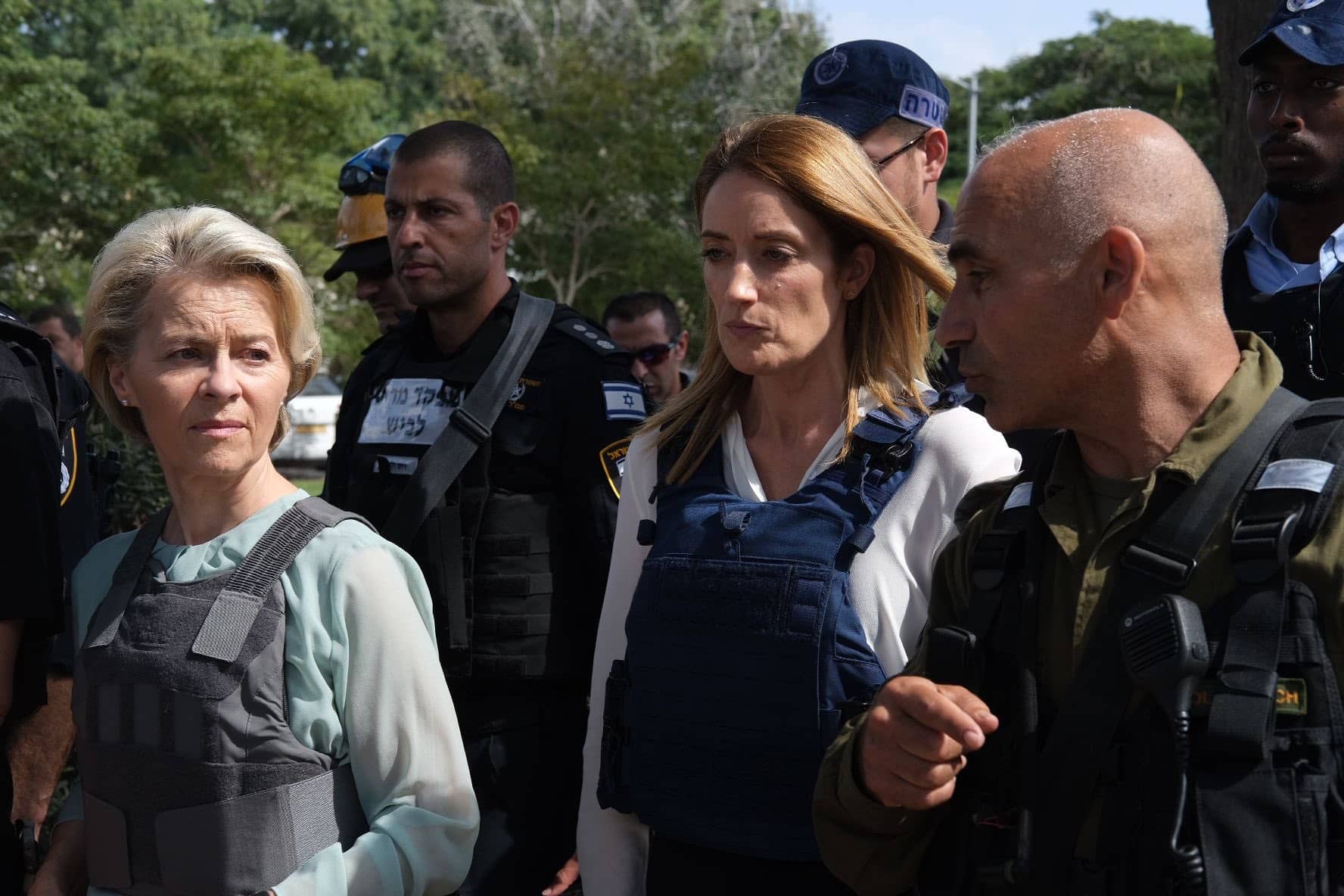
Atieh: “For four years I have been telling the ambassadors of the 27 EU countries at the Political and Security Committee to be careful: the systematic provocations by the Israeli government and its extremists, the violations of Muslim holy sites in Jerusalem, the Palestinian prisoners, the pogroms and settler attacks, the land confiscation policy, the Israeli army’s daily repression of Palestinian villages. All this will lead to an explosion. The Palestinian population cannot be expected to accept this. This has provoked the reaction of Hamas. Anyone under this pressure would react. I don’t agree with the reaction at all, but how can you ask that a people under occupation for 75 years continue to be humiliated?
I warned that the absence of a political horizon would bring someone else with an alternative, someone who says that launching rockets will drive out the occupiers. Even Israel knows that the solution in Gaza is not a military one, and the only way to delegitimize the other side and strengthen the credibility of the PNA is to create a credible horizon for the two-state solution.”
Eunews: If the European Union is not doing enough, what do you think of the position of the Arab countries in the region?
Atieh: “It is a responsible position because it prevents the escalation of the conflict. But on the political level they are very active, you have to recognize that. And on the popular level, there is a great mobilization and solidarity in the Arab world. Some blame the Arab countries for not declaring war on Israel, but what should they do? Put an oil embargo against the Western world? Support or send ammunition to Hamas? Surely we cannot ask Arab countries to open their borders and take in Palestinian refugees. No. That would be another Nakba.”
Eunews: And the Palestinian National Authority, is it doing enough?
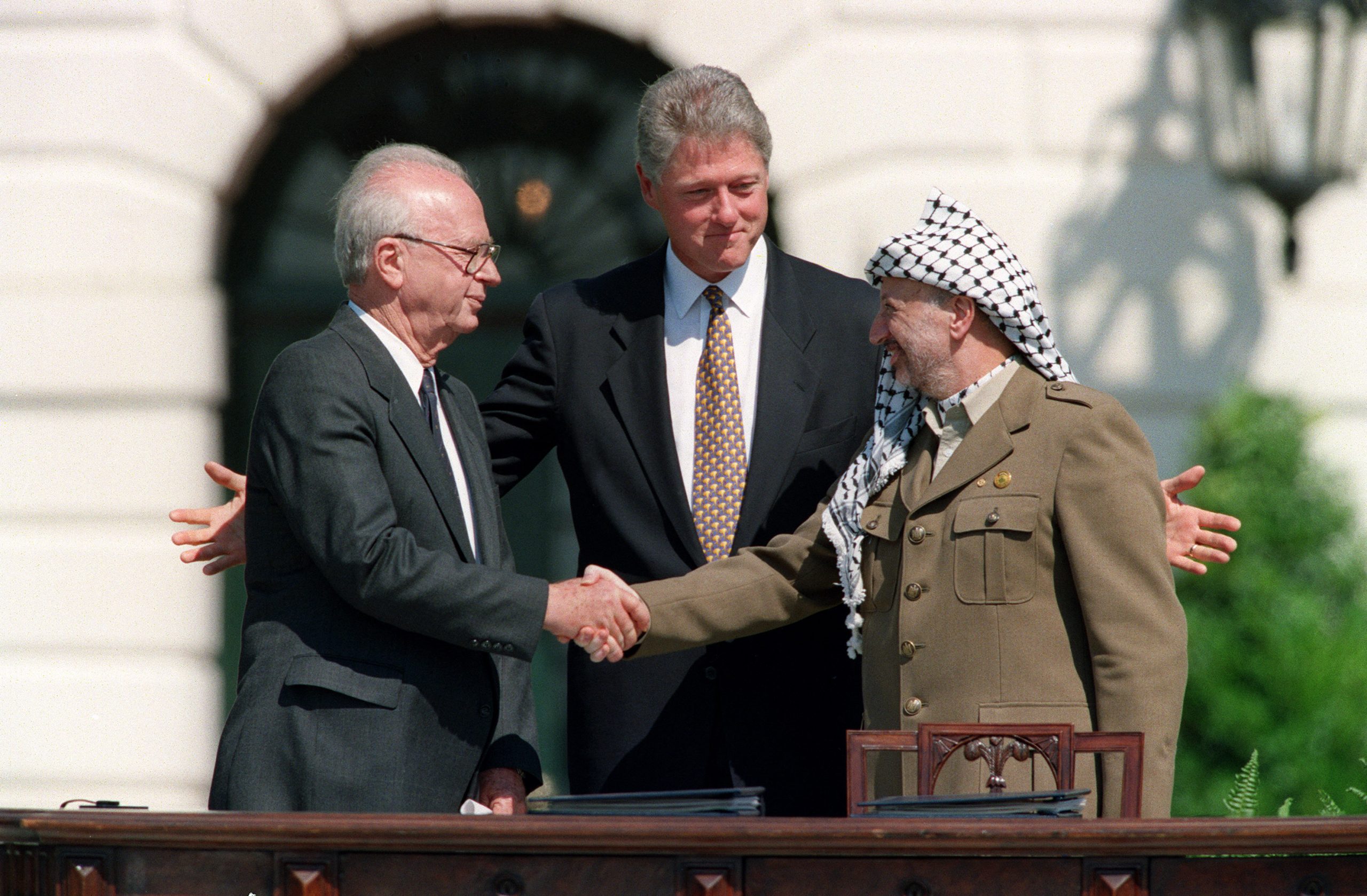
Atieh: “Our concern is how to preserve and bring to an application the two-state solution. That is our project and our priority. You can accuse the PNA of anything, but the one who is killing the two-state solution is the one who is building settlements, doing apartheid, bombing the civilian population. It is Israel. Today Netanyahu never stops repeating that he is proud of sabotaging the two-state solution. It is not the PNA’s action or behavior that is ruining the two-state solution. If we agree on that, we can go further and talk about some things, the performance of our institutions, democratization, whatever. But that is not what is destroying the two-state solution.
The solution in Gaza also passes through the Two-State Solution. There is no separation between Gaza and the West Bank, the PNA can control both, but we need an action plan and clear timelines to end the occupation.”
Eunews: Speaking of the West Bank, the European Commission is working on a proposal for sanctions against Israeli settlers deemed violent. Do you agree?
Atieh: “It is a very good proposal, but all settlers who are illegally in the Palestinian territories should be sanctioned. I have been talking about this for four years and pushing the member countries to take concrete action. They never did anything, but now they have seen that the U.S. will impose sanctions and they want to impose them. It is still the policy of following the U.S.: the EU has no independent foreign policy, at least in the Middle East.”
Eunews: Should the casualty figures made public by Gaza’s Hamas-controlled Ministry of Health be questioned?
Atieh: “It is we, the PNA, who run the health care system in Gaza. And as in every country in the world we count the deaths and attest to the deaths. Education and health care are still in the hands of PNA officials, who receive salaries from the PNA. In any case, I think the casualty figures provided by the hospitals are too low, it will be seen once the war is over and the missing are counted.”
Eunews: Ambassador, one last question. What do you think of the position of the Italian government?.
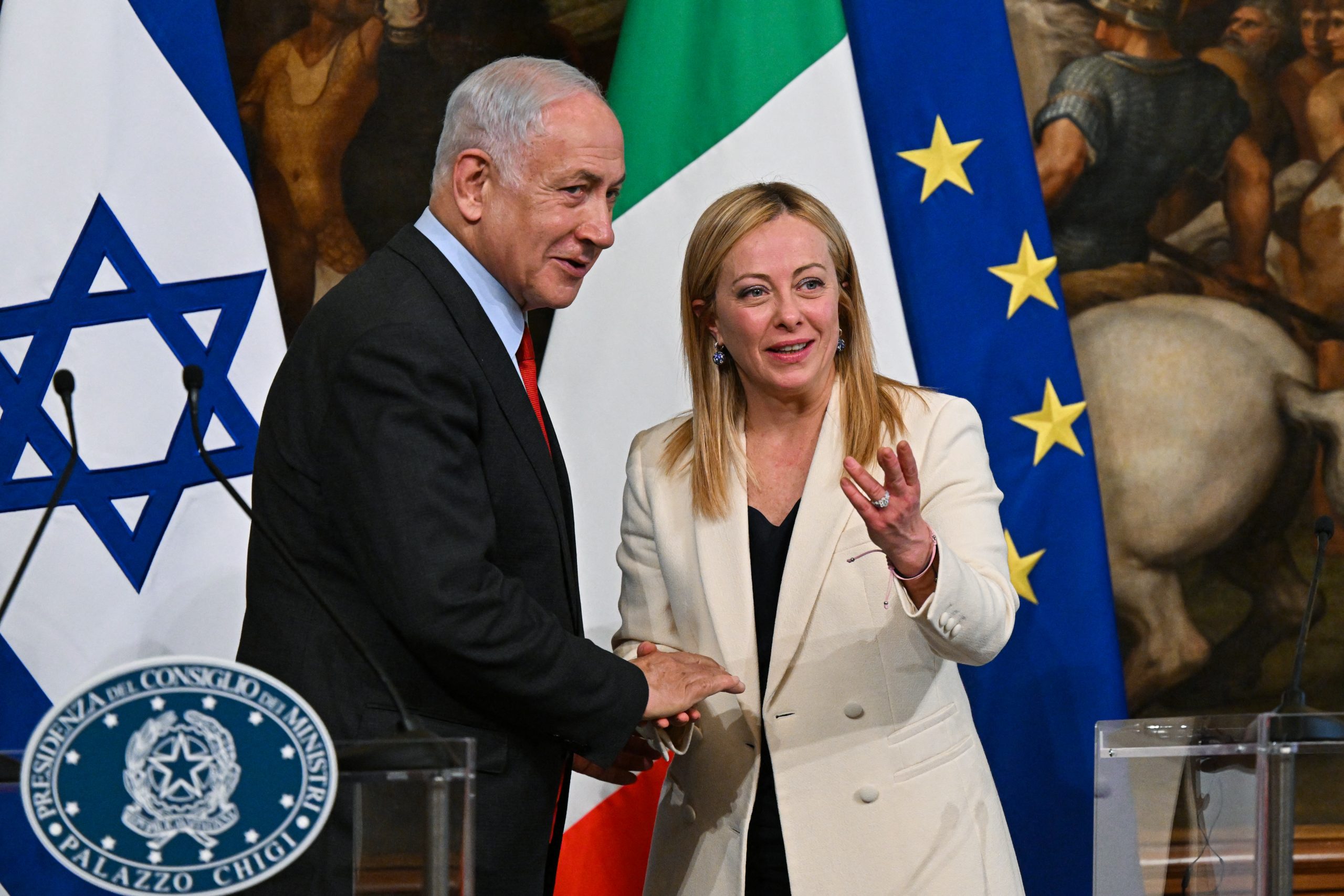
Atieh: “Italy’s current position helps neither Israelis nor Palestinians. It only helps extremists and alienates Israelis and Palestinians even more. Ms. Meloni can keep saying that Israel has the right to defend itself, but where is the absolute right of the people under occupation to defend themselves? It is not a credit to Italy and the Italian people. It is very disappointing because, historically, Italy has always held a balanced position that has helped both sides. But today, the government’s position is an obstacle to ending the war.”
English version by the Translation Service of Withub